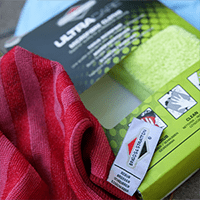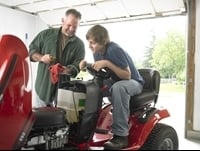2 min read
Riding Mower Maintenance
How to Maintain Your Riding Lawn Mower Have a big, sloping yard with lots of landscaping features like trees and flowerbeds? Riding mowers make...
There are several things to consider when you decide to purchase a new lawn mower. Here are some tips to help you get the perfect mower to match your needs,
Purchase a mower with a quality engine, one suitable for the size job you expect it to do. Briggs & Stratton engines can be found on several brands of lawn mowers. They power mowers ranging from small walk-behinds to large zero-turn mowers and garden tractors. Your Briggs & Stratton dealer can help you select the mower with the right engine size for your yard. Find a Briggs & Stratton dealer in your area.
The size of your yard will help determine the best mower for your needs. Generally, a walk-behind mower is a good choice for yards that are about 3/4 of an acre or less. The smaller your yard, the smaller the mower deck can be - the actual width the mower will cut in a single pass. A 20-inch walk-behind mower may be perfect for a small yard, but you will probably want a 21-22 inch mower for a larger yard to cut down on mowing time.
For yards larger than 3/4 acre, consider a rear-engine riding mower or a lawn and garden tractor. Riding mowers with rear-mounted engines provide good visibility and excellent mobility around trees, flowerbeds and other landscape features. They are available with mowing decks that range from 28-42 inches wide and engines from 12-20 hp.
For yards in the one-to-three acre range, a zero-turning rider or front engine lawn tractor may be appropriate. Look for a mower with at least 14-16 hp and a wide mowing deck – at least 38 inches – to get your lawn work done quickly.
Yards larger than three acres are best handled by a larger zero-turn rider or a garden tractor. Look for models that have at least 18hp engines and mowing decks in the 44-54 inch range.
A small flat yard requires only a typical walk-behind mower. If your yard is sloped or hilly, you will want to consider a self-propelled walk-behind mower rather than one you will have to push. A walk-behind mower with big back wheels is easier to maneuver across rough terrain. All riding mowers can handle varied terrain, although some mowers handle better on slopes than others.
Care must be taken when mowing on slopes and hills. If you are using a riding mower, mow up and down the incline, never across the incline. With a walk-behind mower, always mow across the incline, and never pull a mower backwards towards your feet. Put safety first, and always dress appropriately when using your mower.
Take into account your age and physical condition when choosing a mower. A self-propelled mower may be appropriate for even a very small yard if pushing a lawn mower is physically difficult. Likewise, a riding mower may be the right choice for a half-acre yard if you are unable to walk easily behind a mower.
While optional items add to the cost of a lawn mower, they are worth considering. Top among options is a mulching blade for your mower. A mulching mower returns the finely cut grass pieces to the lawn as a natural fertilizer – you won't need to collect and dispose of clippings. Read your owner's manual for instructions on how to properly operate your mower in the mulching mode for the best results.
Bagging mowers do what their name implies – you attach a grass catcher bag to the side or back of the mower to collect the grass clippings. You can choose a rear-bagging or side-bagging mower. The rear-bagging models are more maneuverable around trees, landscaping and those tight spaces in your yard.

2 min read
How to Maintain Your Riding Lawn Mower Have a big, sloping yard with lots of landscaping features like trees and flowerbeds? Riding mowers make...
2 min read
How To Fix It Yourself, Fast! It happens to the best of us, and to the best of lawn mowers: Suddenly, your most important landscaping sidekick...

2 min read
We understand. There’s a certain bond you have with your weekend turf warrior companion: your riding mower. So, of course, you don’t want to...